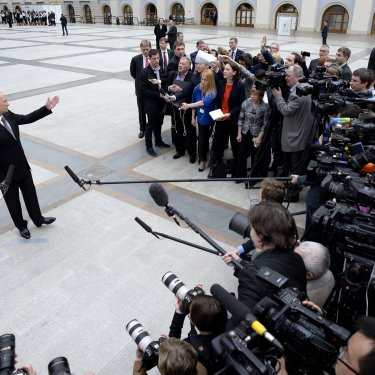Ever tighter grip on media in Russia, despite small rise in Index

Harassment of independent media outlets continues to increase in Russia although it has risen four places to be ranked 148th out of 180 countries in the 2016 World Press Freedom Index published today by Reporters Without Borders (RSF).
Russia’s rise is due to the worldwide decline in respect for media freedom. The Russian authorities have in fact stepped up their pressure on independent journalism. This is confirmed by the deterioration in Russia’s country score, which rates the level of media freedom violations and which is an absolute measure, unlike the country ranking, which can be affected by developments in other countries.
Ever since a major wave of protests in 2011 and 2012, President Vladimir Putin has been clamping down on civil society and restricting the space for debate. And he has been tightening his grip even more as a result of the Ukrainian crisis, international sanctions against Russia and the economic crisis.
The Duma (parliament) has been adopting draconian laws at such a furious pace in recent years that it has been dubbed the “mad printing press.” The space for freedom of expression is shrinking while drastic curbs on foreign investment in news organizations have undermined the independence of certain leading media outlets.
While the leading TV channels continue to inundate viewers with propaganda, the climate has become very oppressive for those who question the new patriotic and neo-conservative discourse. A witchhunt is being waged against independent media, which are increasingly branded as a “fifth column” seeking to destabilize the country.
Dozhd TV, the only independent national TV channel, is again available on certain satellite and cable services but is still subject to many forms of harassment while the leading media defence NGOs have been declared “foreign agents.”
Relatively unrestricted until recently, the Internet is now being reined in. The list of blocked websites, created in 2012, keeps on getting longer. Influential bloggers are now required to register under their real names and to comply with requirements similar to those imposed on the media.
Countless social network users have been arrested just for “liking” or posting links to comments regarded as extremist, while the authorities are currently filling the remaining gaps in the SORM Internet surveillance system, said to be as effective as anything used by the NSA.
The increasingly oppressive climate at the national level has encouraged powerful provincial officials far from Moscow to deal more firmly with their media critics. The closure of the Siberian independent television station TV2 and the persecution of opposition bloggers in Rostov-on-Don and Izhevsk are just some of the recent examples, while the Chechen dictator Ramzan Kadyrov skilfully maintains a climate of terror in his republic.
The enduring features of the situation in Russia include the impunity enjoyed by those responsible for violence, including sometimes deadly violence, against journalists. But they also include the stubborn resistance of many journalists – both Glasnost veterans and Twitter generation members – who keep finding new ways to report the news.



